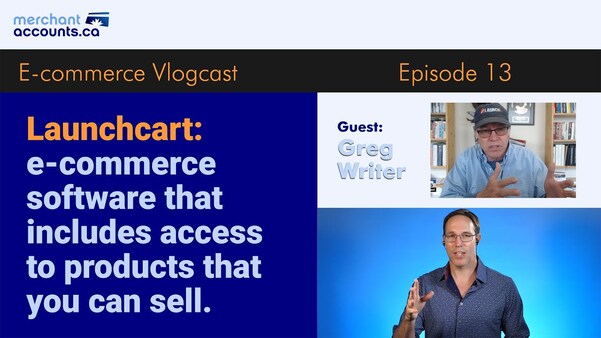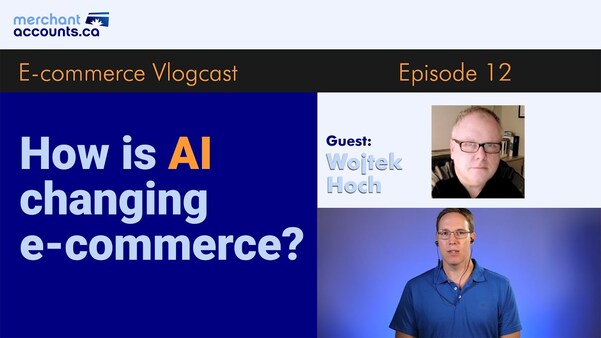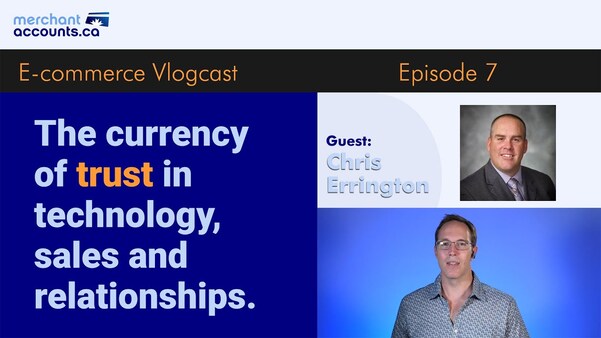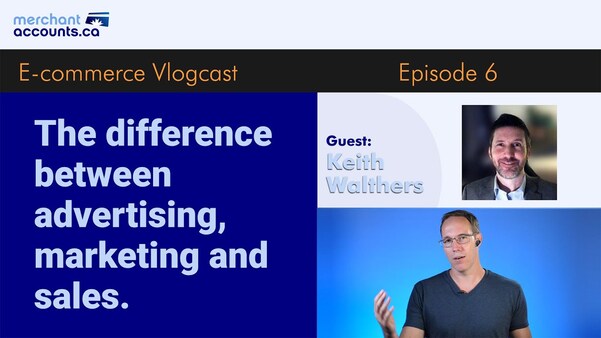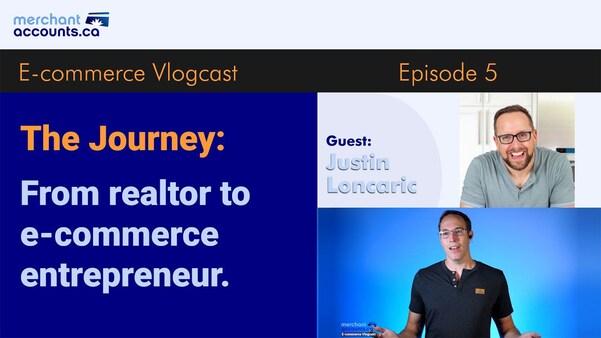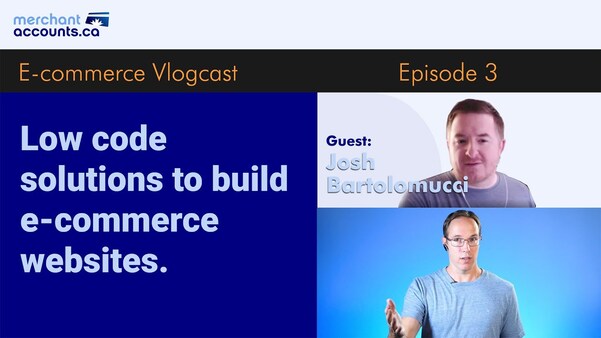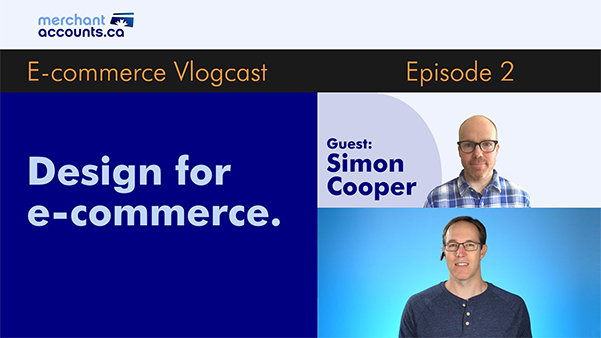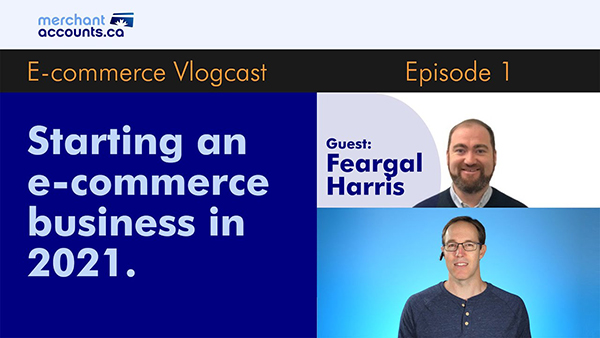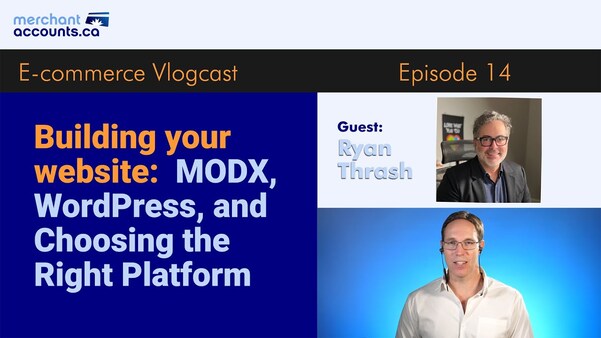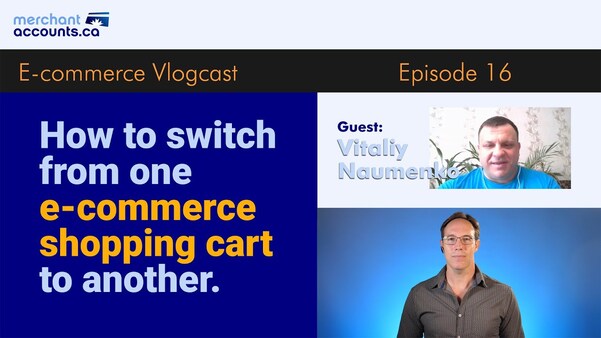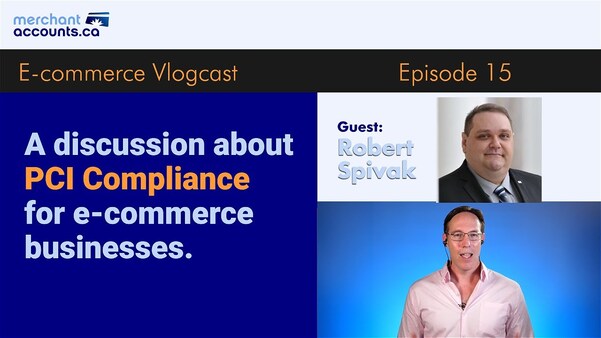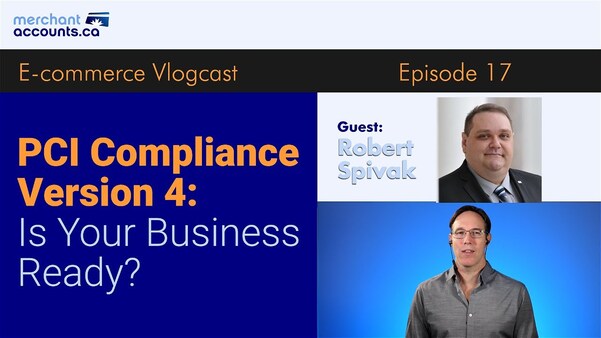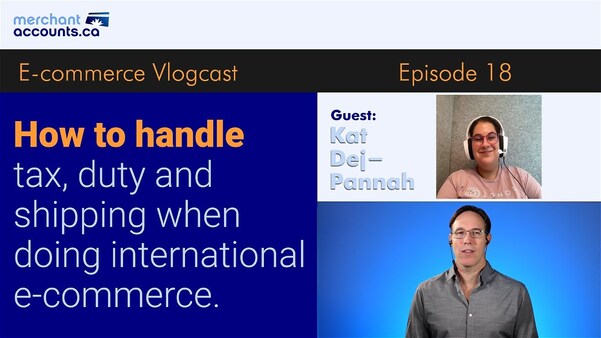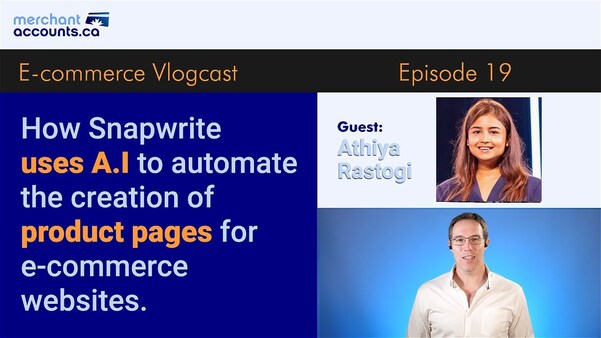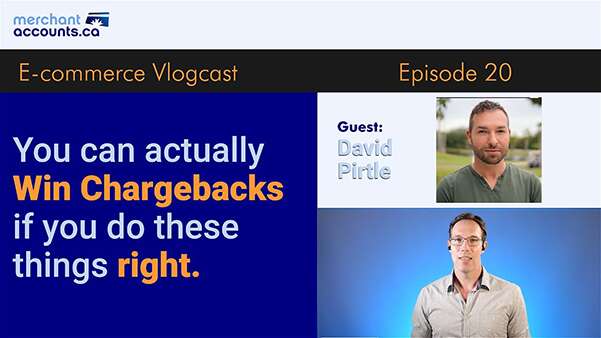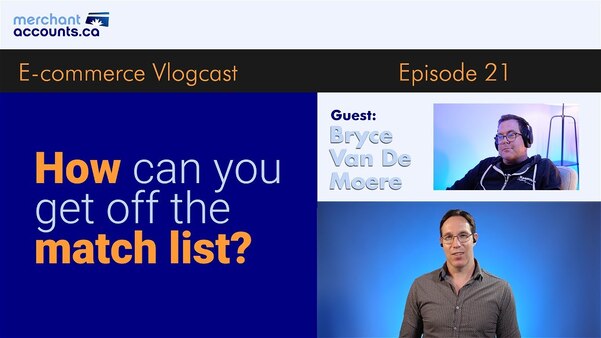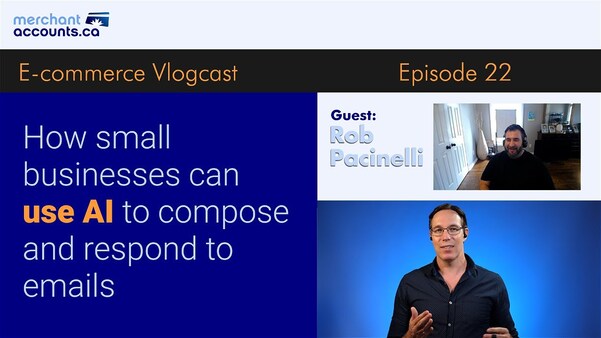August 02, 2022
by David Goodale
osCommerce: Version 4: re-building the classic open source e-commerce platform
(Slightly edited from video transcript for greater readability)
David Goodale:
Hello, David here at Merchant-Accounts.ca with another episode of the vlog cast. Today I'm talking to Vadym Gurevych and Vlad Malyshev the current owners and minds behind osCommerce, I should say osCommerce version 4, which is a complete ground-up rebuild of one of the absolute most popular open source e-commerce platforms of all time. Guys. Thanks for joining.
Vadym Gurevych:
Today. Well, thank you, David. It's very nice to be here on your vlog. I just hope it's not as hot over there as it is here today. We in Britain just enjoy the very hot summer today and, fortunately, or unfortunately I think fortunately it's the hot summer for osCommerce as well because we're just about to launch a new version.
Vlad Malyshev:
Hi there. Nice to meet you. William focus here previously. It's my first time when I speak to you and thank you very much for introducing me and for inviting us to your vlog.
David Goodale:
Perfect. Now there's a lot to cover today and I'm just curious, how do you end up rebuilding? What is essentially one of the most popular e-commerce platforms of all time? How did this happen?
Vlad Malyshev:
It's a really good and interesting question. We have been working with osCommerce for 22 years right now. Let's say sometimes the main osCommerce version 2 became unattended.
Vadym Gurevych:
I would just like to add that, it's, it's more about, it's just more about change in life and business. Why did things change? Why do things get reinvented, redone, rebuilt, because the time has passed and the old software, same as some old furniture needs to be replaced with something new, osCommerce as such has been going for 20 something years? 20 years ago, it was a great tool, amazing tool. Even 10 years ago, it was still something valuable, never since then has a major upgrade been released. So if you think about this 10 years in software development is like, I don't know, it's like millennia perhaps in human life, isn't it? So you can't possibly expect, a decent business to use a piece of software, which is 10 years old, a piece of software that is responsible for your online sales. And we know that online sales are the majority of sales in any business now, isn't it? We just have to offer something new to the users of our osCommerce being merchants, being developers, something new, something more interesting, faster, more secure something more 20, 22, rather than the year, 2000 or the year 2010. That's why,
David Goodale:
Right. That makes sense. Are there still people using the old version today?
Vadym Gurevych:
Absolutely. 46 or 48,000 installations across the globe half of this, or? Well, 40% of this is in the US, and then comes Germany and Netherlands, the UK France, and loads of other countries. There's a big community, a big community of users and developers.
David Goodale:
So to me then, and one of the obvious use cases is to take those people running the legacy osCommerce and get them on the new version then.
Vadym Gurevych:
Absolutely. That's the intention. That's phase number one, or maybe phase point half. It's one of the first tasks that we have planned out is to offer upgrades to those, who still have a business run in all those osCommerce.
David Goodale:
Well, I'm very curious about that because upgrading anything is always a bit of a challenge, and anybody running osCommerce, who's probably very excited by the potential, the concern that's probably whispering in their ear. It's like, how hard is this going to be? Can you address how easy or difficult it would be to perform that upgrade?
Vlad Malyshev:
It depends on how complicated the installation is. If this is a basic website, but not an updated one, it's just a couple of days. If this is a big portal with an amount of customization, then yes, it will be some time to do that. But for most cases, it's just a couple of days, maybe a couple of weeks, if we're really busy but we have some partners who can do this for our clients as well.
David Goodale:
That's what I was about to ask. So if people want to outsource it, like, Hey, I want to run the new version, but I don't want the headache. Can you guys do it? Or can you connect me with someone that can take care of this or at least guide us through this process?
Vlad Malyshev:
Exactly. It's both. We are, as a company, we're working with big brands again, as I said previously we know how to move big projects, and big portals from one source to another one. On other hand, there are a lot of small shops that can be moved as well. So we have partners who can help with smaller projects. So for everyone who wants to move from all diversion to EST one, it's a bit not waiting in a queue for ages
Vadym Gurevych:
Well, it depends really because we're talking about thousands and thousands but we appreciate that. Something new can be a bit scary as well. People are used. It doesn't work. It's old, it's not safe, but people are used to it. So we understand the sentiment, but the necessity, the business necessity is there. The old osCommerce needs to go if. Businesses choose to go elsewhere, choose Shopify, choose, I dunno, magenta, or something else by all means. But if they choose to stay with osCommerce, we'll offer them a new version of osCommerce, which is true. It's not exactly the, all those scammers sort of enhanced or upgraded. No, it's done from scratch. But that from scratched is, is inspired by many years of using exactly oil scammers. It was done by us, by the company called Hobe and Hobe was a partner, supporter, contributor, sponsor, whatever we call this of all those comers for almost 20 years. So everything that new ICERs is, is based on our experience, developing, using all those comers and on our experience, developing our system, which was inspired by it,
David Goodale:
Right? It's a total rewrite, but with all of the knowledge, from many years of running, it's like a spiritual successor from the sounds of it.
Vadym Gurevych:
Yes, that's a good one. I like it.
Vlad Malyshev:
Vadym Gurevych:
It lives on.
David Goodale:
Now to any of our viewers watching this. One of the things that I do want to make everyone aware of is that a lot of the team at osCommerce are based in Ukraine. And guys, I want to give you a chance to talk a little bit about what has been going on and what you've had to deal with, and, you know, the situation there.
Vadym Gurevych:
If you don't mind flood, I'll start and then you'll continue to give them some real pieces of advice. Historically, we've all lived. We had all lived in Ukraine. I'm from Ukraine from Kharkiv. Vlad from the Donbas region from *unintelligible* and pretty much all of us our colleagues as well. I moved to the UK in 2005. So I've been living here for 17 years. However, I would visit Ukraine three, or four times a year. My dad used to live in Ukraine and my friends, my business partner, my colleagues, my relatives, well a lot.
Vadym Gurevych:
When we conceived the idea of binary commerce, well, we had considered Ukraine with Russia occupying part of it in the east and Crimea, but for us, it wasn't too bad. I mean, however many things changed. And as we were just about to launch, because we were planning to launch in the, uh, middle of March, uh, this version four was going to be launched in the middle of, of March came the 24th of February. And, um, a full-scale unjust, um, criminal invasion of Russia in Ukraine started, and it changed many lives or it ended many lives as well, but it changed many lives and it changed our plants as well. We watched our people have to move, some had to move outside of the country. Uh, some women with children left, uh, men had to stay by law but had to relocate V blood is one of the very few that stayed in the car, which is closer, sir, to the front line. And his own house was pretty much destroyed by several MIS attacks. I don't know why they give well, they kept sending MIS out to destroy the particular house but still are.
Vlad Malyshev:
It doesn't like those farmers.
Vadym Gurevych:
Exactly. But that's one of the reasons why we're now in July and a launch in July because, um, we had to move our people. We had to do something with the equipment, with the internet connection we had to wait until they are safe. And then it does not just say physically it's the psychological, aspect that is very important, but it only makes it even more important for us to be able to say that oil commerce as a free open source become software is open for everyone who wants to use it legally in their country. We don't put a barrier to anyone, you know? Um, and we welcome all the merchants and all the developers, um, to use it. And also for me because I wasn't in Ukraine when there was started, it's important for me to appreciate and recognize the effort made by my colleagues, my coworkers, by my friends in Ukraine that managed to complete this huge project. Pretty much under fire. There's been times and times.
David Goodale:
I mean, can I ask a question, Adam? I'm sorry for cutting in, but this is just so incredible to me. Like, this is one of those things in life where you think you have all the problems in the world until you have a real problem. Like, I got a flat tire now I'm off, or my server went down and I'm stressed, but you guys are dealing with real problems. Yes. How do you even operate when it's like, you know, I'm stressed, you know, it's like, I didn't finish my year-end and it's backed up a little bit? These are nothing. How do you operate?
Vadym Gurevych:
There were things. To function human leaders get used to it. The first for me personally, I mean, for Vlad, obviously it's so much more difficult because he's actually in there and for the rest of my team, pretty much except for those who went outside of the country. But for me, the first few weeks were the hardest, your brain doesn't work. Just, you're overwhelmed with emotion and you just check the news, you just check on your close ones on your friends' family. And it's a constant vicious cycle. You just keep doing that. You don't sleep, you don't eat. You just do that news check. If they're alive news check they're alive. But then, the necessity of life got in and you think okay, well, God. I've got some bills to pay. I've got to do something. Clients are waiting. Clients were very understanding.
Vadym Gurevych:
And the community of first comments, they were very understandable as well. Um, we sent openly that things were delayed because of war and, uh, well, everyone understood that. But then I guess the scariest thing is that you get used to, that you get used to reports of so many missiles that hit the city of Cark where almost 2 million people lived before the war hit every day, every night, every day. Then you hear of people bombs. Well, not people of them bombing Kyiv or
David Goodale:
I mean, sure. The mind's capable of normalizing it, but, but it doesn't make it any less sad or devastating
Vadym Gurevych:
First of all David, about your day, for example, what is your day like?
Vlad Malyshev:
If you will open, uh, photos there, you may, well, almost easily recognize me
David Goodale:
It's. And then how long ago was that?
Vlad Malyshev:
Uh, for me, it was for two months since I was there. And after the second contusion, I went to the hospital for a couple of weeks.
David Goodale:
So this, but this is all since the invasion began, this is recent.
Vlad Malyshev:
Yeah, it was from, um, 27 or 29 or February. So it was not like day, day number one. So it was in a few days, like 20, 27, and 28. So since then, uh, I go to rhetorical defense, then some actions happen
David Goodale:
Do you carry any injuries with you, from your time?
Vlad Malyshev:
It was actually in mine, so I was injured everywhere. It's multiple images.
David Goodale:
That is incredible. And then, and then after being in, literally in the middle of a war, you're still somehow related to the ongoing development of osCommerce in the kind of in the middle of all this.
Vlad Malyshev:
Why not? So it's independent things.
David Goodale:
Vlad Malyshev:
Sure. The main answer is we have to fight, but we also have to do business. So we have to split our time.
Vadym Gurevych:
It's about time management for you.
Vlad Malyshev:
David Goodale:
Oh my God. Time management and everything, even when there are missiles involved. Uh, it's just crazy to me. I don't know how to segue that, but I just want to say that I would speak on behalf of I'm sure. Our viewers, and just say that it sounds like an incredible job. And it's just part of the legacy of the osCommerce and the relaunch that you've done this in such incredibly adverse conditions.
Vadym Gurevych:
David, I've just sent you a link to a local newspaper here, which shows you the place where Vlad is currently sitting and how it looked just a few months ago.
David Goodale:
It's it's unbelievable.
Vadym Gurevych:
That's exactly the house where, so basically the part of the house still looks a bit similar to that.
David Goodale:
Vlad, are you saying this is where you're sitting?
Vlad Malyshev:
Yes, exactly.
David Goodale:
I mean I don't even know what to say. Like.
Vadym Gurevych:
In some of the takes, you see the bricks, the bricks on the wall behind him, some of them were blown away by the explosion. So he glued them back in
Vlad Malyshev:
David Goodale:
You wouldn't even know, like, where's you're upstairs, like in the picture there's no upstairs. Like it's just the front half of your house is missing.
Vlad Malyshev:
Uh, yes. Half of the house has been destroyed and yes
Vadym Gurevych:
But the office is still there. See,
Vlad Malyshev:
Yeah. Half of four is yet. Okay. It's rebuilt already. And also all kids' rooms are fine. It's funny, but no one kid's room majored. So this is only two rooms. Uh, well not two rooms, but three rooms. What was not the major?
David Goodale:
I just, I can't even, it's very difficult to have an interaction when this is blowing my mind with the adversity that you've gone through and you're sitting there with a smile on your face. And I mean, like, your office there where you're sitting, you wouldn't even know, I guess you've tidied it all up and you've, you've gotten it together. I mean, that's what it seems like. Wow. Glad you have. I just dunno what to say other than you ha I have tremendous respect for you and how you've continued functioning and what is effectively a ridiculous, impossible environment that nobody should ever be forced to go through. You're doing incredible. The big thing with osCommerce back in the day, one of the secret reasons why it was popular at the start was the Open Source part of it. Yes. Which open source it was free. Is there still a free version of the new one?
Vlad Malyshev:
Yes, exactly. It's the free version of core osCommerce version four and also together to the core. We added what we call the app shop and inside of the app shop, we have a lot of modules or extensions, which are also free of charging and why we added so even though we are osCommerce holders. We put everything, not to the core, but put, to some extensions to support system, to, our clients set up, not just minimum version, but enough to run business and don't take megabytes of code. They will never use it. So if they want to update it, oh, they don't need to use sunset. Partly they will use it at the beginning of course modules from osCommerce. So osCommerce made modules osCommerce made extensions, but download on demand. So don't need to keep a load. Don't need to waste, uh, this space or make it slower because of too many extensions run. If you need something, go up and set up for your charge, that's it.
David Goodale:
So Vlad, what you're saying, what I'm hearing is it's not one of the principles behind the architecture of it is it's not bloated. It's more like by default, it's a minimal framework, and then turn on what you need to keep it running lean and quickly. Is that, is that one of the principles behind it?
Vlad Malyshev:
Yes, but it's not like a minimum.
David Goodale:
Okay. So if I was to put you guys on the spot and asked maybe like, what's, what's three really good use cases for the upgrade, maybe three things. The new version can handle more problems than the old one. This was a big problem that you guys have solved in a very definitive way.
Vadym Gurevych:
Okay. Absolutely. Here we go. First of all, it's the service software, all the, all those commerce installations, they run on the previous, well obsolete, those versions of service software, which isn't supported anymore. They need to, they need to begin to stop. They need to be gone. And the cost and providers, keep pushing merchants to do that. You either upgrade or you go, we hear that story every day, every week, every month constantly. So the new version resolves that the venue server software is supported is safer, and secure. It's faster. It's how it should be. So, first of all, second of all, um, think about an average middle-size shop business. They want to do something. They want to change banners. They want to change texts. They want to move things around. They want to add content pages. They want to add landing pages.
Vadym Gurevych:
They want to change email texts. For example, that goes to the users. When they make an order, how do they do it in osCommerce? Well, they either learn the code, which is cool, but it's not really for a business owner, or let's say it doesn't happen very often, or they have to hire someone in the new version. They just go into the back end and edit all of this through the back end through a very visual style editor themselves. So, um, whatever they need to change, if it's relatively minor, if it's designed, if it's content, um, they can do it themselves. So any experiment they have
David Goodale:
Is that like a drag and drop thing, or how does
Vadym Gurevych:
That work? Drag and drop? Yes, of course, but it's not just that it's the, um, how it's done. Um, you can see this in the demo, or we can give you another session and demonstrate it to you. The point is the idea to the market cycle shortens dramatically. They can implement a change, see how it works, revert it, or keep using it instantaneously. Well, pretty much instantaneously within an hour, they'll have a change on their live website, up and running. They don't like it. They revert to the previous version of the design template. Job done, no need to wait for the designer, no need to wait for the developer, no need for anything of that. Therefore business owners are in charge. The same thing for the designers and developers it's much cheaper, faster means cheaper. Doesn't it for them to implement change? If a business owner asks, employ them to do something.
Vadym Gurevych:
So those design agencies, those development agencies from all over the world, get a tool, a toolkit, which is cheap to use. Really. If you compare how much time it would take to implement, um, an online shop in magenta, for example, to the new osCommerce, I'm pretty sure you'll see that osCommerce at least two times and not three times faster to implement and therefore cheaper. That's it? It's a simple economy, isn't it? And then, of course, the third thing you ask for three things, but probably we could talk about hundreds. The third one is more bio and SEO-friendly straight out of the box. You installed it there. It does all the onsite, uh, search engine optimization itself. You can, again, have full control over everything you can think of, including images, file names, or, uh, if you name a product, you can store the old URL in the redirect and you don't lose it for example. And there are so many other things there. And of course, it's more about friendly. It's fast, Google loves it. It's always in the green, you know, the page speed monitor and, um, those onsite search engine optimization tasks are taken care of by the system itself. There you go.
David Goodale:
Vlad Malyshev:
So yes, exactly. You say correctly.
Vadym Gurevych:
It's all, it's all for business, you know, for the business of the merchant, for the business of the developers, we are very business-minded people. We don't do something for the sake of doing it. We do it because our experience in our understanding tells us so, so if there is a feature in the new commerce, or if there is no feature in the new O S there is a reason for that, there is always a reason for that. And it means that one of those thousands of online shops that we developed ourselves did have it, or didn't have it for a particular reason. And we learned a lot on our way from probably the best advisors from business owners themselves.
David Goodale:
One of the things I want to talk about the kind of related to what we were just speaking about there is these improvements and changes, but as it, when you're making a change with open source software, it's possible to, or at least historically it was possible to break it. Like I, back in the day, 20 years ago, I was, you know, administrating my free BSD server. And I assure you, I was very good at breaking it. Uh, and it was free BSD. It was, it was open. It was the same type of thing. It was, it was on me to deal with. And then I eventually started working with many years later, Rackspace who, uh, if anybody follows out there, no one for very good support and that type of thing. So what support plans, if any, do you have to help people maintain and patch things, as, as a need arises?
Vadym Gurevych:
We offer several commercial services to come along with the with osCommerce. We're here to make it a successful business. First of all, for us, but not just for us, for the community. There is a massive forest commerce community, with about 300,000 members in that community. And we're talking about a mixture of business owners, oh, well, business people and, uh, designers, developers, consultants, um, you can think of anyone. And, um, we as oil goers ourselves, we offer several support packages and many standard services. Anything really in terms of customization, we can customize it to any extent, however, we don't want to lock it to just us. It's open to everyone. We want to make it a sustainable ecosystem for all the people firms, and companies who want to participate to be able to participate and earn good money off osCommerce.
David Goodale:
So one of the challenges, uh, that I think of when I think of open source software is just the environment in getting it installed, especially, you know, if I read like a, a Unix book, it just makes my blood pressure go up. You know, you need this module, you need this dependency. It's like, what's a dependency? Where do I get it? So I'm curious to know if and how you've made it easier for people who are not technical to run an open source platform. Have you addressed that?
Vlad Malyshev:
This is a really common question right now. And we, uh, check the situation on the market and as a solution for our client, we created what we call, uh, host resource commerce. So we provide free of charge one-month environment where you have everything. So you don't need to know about Linux units or anything. You don't need to know anything about that. So you don't need to spend the time to find hosting for a wider setup, et cetera, et cetera. You just need to use it. So you go there, you just, we wide, we stop everything for you and you go inside and check always commerce, not hosting after one month. If you want to stay with always commerce, you move to paid cheap paid service. If you want to host somewhere else, you take everything you build in this environment and take it with you. That's it. And also ask for technique. It's a really good question, David. We took this into account and now the system update was done in the backend. So you don't need to do any, uh, coding to update the system. You just click a button, update a code, and covers you.
David Goodale:
Now, Vlad. Is that just if it's in your environment or is that in any environment?
Vlad Malyshev:
This is on any environment, uh, but we suggest using our environment to staff. So you may use our environment to learn what is osCommerce, and then you may decide, to stay in our environment and go somewhere else. It doesn't matter updates available everywhere.
David Goodale:
Well, I know for sure, there's a classic thing about open source versus hosted platforms. Like something like a Shopify. And I'm very much of the, I want to own my infrastructure. I've always leaned way more towards open source than a remotely hosted platform where you can't truly control anything. And I have to acknowledge that there are users out there that shouldn't be using platforms where they're responsible for running it, but then, but for people that are reasonably technically proficient, it was always a stress to know that things could break or, Hey, I have to update my, whatever it is, to get it working. And so it sounds like you guys have gone a long way towards addressing that problem because that is one of the historical problems with open source software.
Vlad Malyshev:
The things are, this is a kind of hybrid osCommerce are version four. It can work, both ways. So it can be end hosted solution and it can be a standalone solution. So, uh, this why on our environment, we provide with, uh, environment as such, but, but we allow people to have FTPs there. We, all of the people see database noise as such no
David Goodale:
So as I'm listening to you guys, uh, one thing that's becoming apparent to me here is a tremendous amount of planning because you guys have addressed, uh, administrative problems. For example, making the interface easier. You talked about making it easier to install with some server stuff. Uh, you also addressed, you know, lots of aggregated or, uh, cumulative improvements that have happened over many years. So, and additionally, the app store, which allows people, if there is a hole in the functionality for someone to come in and do something very custom to maybe make it, do something well, that it doesn't do that well today, I'm curious to know this was a really big project. How many years has this taken you and, what are some of, some of the challenges or even lessons that you've learned along the way of rebuilding this very seminal platform?
Vadym Gurevych:
Well, it's a journey. Um, probably the length of it is half of my lifetime, pretty much because the first, uh, e-commerce store we made in May 2002, and strangely enough of funny enough, it was in our commerce and ever since then, pretty much, that's the only thing that we've been doing, building e-commerce stores and all the knowledge, all the experience, all the scale, it is what we've built in those 20 years. It that we accumulated is what we've put into the new version of our, and the challenges. Of course, there were a few technical challenges. Of course, there were a few administrative challenges and, uh, whatever else you can think of, but the biggest challenges perhaps are always personal challenges for me, for me, for example, the biggest personal challenge was to learn, to let, go to understand, to take it into my heart, that you can't make something that everyone will like, that you can't follow everyone's request because then you will lose where you go into.
Vadym Gurevych:
You'll be just pushed off your way. And I've learned that from that guy in the yellow and blue t-shirt from blood, because he seems to be better at grasping this target and staying on the target for me, I would listen more and I would try to make everyone happen. It's probably wrong. You need to persuade, um, your own. You, you need to pursue your own goal, your target based on your gut instinct, based on your understanding of where and how you're going, what you're doing, and then you will achieve success or not perhaps, but it will be your, it will be the only right way you can't do that. If you allow the people to decide for you, how and what you should be doing, the same thing within yours, commerce. That's interesting. You have it. Um, you have it now. It's a fantastic new, very feature-rich system.
Vadym Gurevych:
And it's there for taking it's free. It's paid it's everything. However, some people would prefer to stay with the old version, which is well, which was great 20 years ago and perhaps even 10, 15 years ago, but it's not anymore. It's not safe to use. It's likey buggy, it's old. It's nothing. However, you can't expect all people to want it. The new version, they will stick with the old one for no particular reason because they just not because there is any business sense in it, but because there is a piece of, um, reminisce, I guess, nostalgia, they think back 20 years ago when they were 20 years younger, when the world, the world was slightly different, perhaps one of e-commerce was great and was the number one solution in the world for e-commerce. But the thing is they can't sustain themselves on that belief. Something new needs to happen, something new needs to be there. And we are offering the new e-commerce as a way for them to really turn their life, turn their business around and achieve certain success to make it a mainstream e-commerce platform as it once was. But now it was in decline for so many years, but now there is a chance of this happening again, and that's, we welcome everyone. If they want to join us on this, on this journey to a successful future.
David Goodale:
Thank you for that Vadym and Vlad. I'm curious about something, because Vadym raised an interesting point, which is, you know, the compromise between making everyone happy and, and not losing track of your vision. Or I think maybe I would rephrase that, uh, staying on staying on the core functionality and not, not compromising in a way that weakens the things that are most critical for the platform to accomplish. So if Adam looks to you to make sure that that doesn't happen, then how do you do that?
Vlad Malyshev:
Uh, think you what, for some good words and ask what said, uh, in some cases, in some cases, uh, people don't take into account current needs. So like bill Floyd says, the grass was green in the suite was sweeter and everyone know it's not a trip. The answer to your question is really simple. Uh, you should understand what you do and you should believe in what you do. Uh, I hear a really big experience. I lead more than 3000, uh, projects. And I know, I know at the end of the store, if you do everything correct, and if you have a vision of how projects should be in the end, it's over success. So experience, experience, and experience, that's it. And of course, learning, learning, learning what people need right now, what people, uh, need to have and what more than, the direction is. Some time ago, like 20 years ago, the spa was not a problem right now it's even maybe criminal, and so on. So everything changed. We should take this into account.
David Goodale:
It sounds like two things it's. You led over 3000 projects. You have the knowledge, but there's another element to it, which is very hard, which is the ability to say no to people to their benefit. Right. And that's something that I struggle with. I am not an overly confrontational person, nor am I suggesting that you are either. But I think it sounds like you have the ability based on your experience, not just to realize what needs to be done, but to tell a client sometimes no, this is not in your best interest or no we should do this instead.
Vadym Gurevych:
Absolutely. That's what, we're good at that. What differentiates us from an e-commerce agency, is what we do differently from many others. We're not shy about telling the truth to clients based on our understanding of what would be best for them. Then this is what they value. This is what they like. Very few would be offended by that. Very many would compliment us and would say that this is exactly what they were looking for, but no one would give it to them.
David Goodale:
Exactly. Why hire an expert if you're not going to listen to them? Which by the way, some people actually will do,
Vlad Malyshev:
Sometimes it even became strange. Why? Sometimes we even may lose a little bit in terms of money
David Goodale:
In the longer term
Vlad Malyshev:
in business and yeah, e-commerce was not our first project.
David Goodale:
Exactly that. Exactly. Well, this has been some great advice. Now I'm curious to know if people, I'm pretty sure, everybody can find the osCommerce website, but I want to give you guys the opportunity. If people want to find out more about osCommerce and specifically version 4, and perhaps if they want to demo it or anything like that, what can they do? What what's your advice?
Vadym Gurevych:
Well, the best advice is to go to the osCommerce.com website. There is a link to the demo version. There is, as of tomorrow, there is going to be a link to download the version onto the server, or for the first time in the osCommerce history, the cover installed onto an oil server. So you don't have to do it yourself anymore. You can have this done automatically for you. You do this and you start to play with its pocket, do whatever you like with it. There is a Wikipedia-style website that describes the functionality of osCommerce as well. And of course, there is this fantastic forum where hundreds and hundreds, thousands of people are there to discuss how to use osCommerce. What's the best practice? If you need help, they will help you.
David Goodale:
Wonderful, wonderful. I wanted to thank you both for joining and maybe I can have you on again, sometime in the future. And you can talk about the development because I'm very curious at this point, it sounds like what you need. And you alluded this to earlier is you said the hardest point may be in the future. Well, when you get thousands of users, stress testing this platform, that's when you're going to have all the things come up that you can improve on. And it sounds like you're at maybe the most exciting part of the journey so far.
Vadym Gurevych:
Yes, we are very much looking forward to it. It's going to be a tough perhaps, but such a pleasant person for me, for example, experience, because I want to see how the product that all our team pretty much has been working on for so much time is all there helping real people, helping real businesses, improve and generate more. As I said, sell better, sell cheaper, deliver faster process faster, and earn money. And that's, that's amazing because we always wanted to give the world a very nice, very capable tool that they can use. And we are just doing it now.
David Goodale:
Wonderful. Well, Adam and Vlad, thank you both so much for joining today.
Vadym Gurevych:
Thank you, David. Thank you. It's been a pleasure.
Vlad Malyshev:
Thank you, David. And thank you for your time.
David Goodale:
Thanks, guys.
Need professional guidance?
Contact us for a free one hour consultation.
Can I Help Lower Your Processing Fees?
If you found this content helpful, will you give me the opportunity to quote on your business?
View Rates


